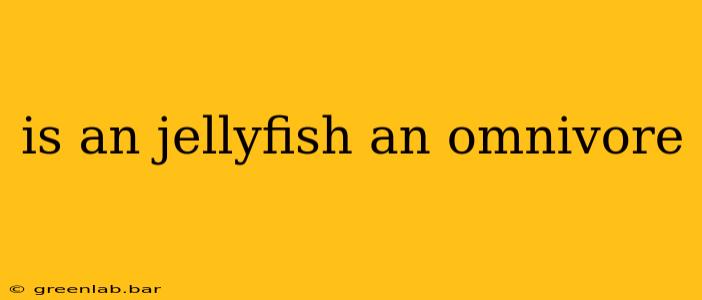Are Jellyfish Omnivores? Unraveling the Diet of These Gelatinous Creatures
The question of whether a jellyfish is an omnivore is a fascinating one that delves into the complex feeding habits of these fascinating creatures. The short answer is no, jellyfish are not generally considered omnivores. While their diet can be surprisingly varied, it primarily consists of other animals, making them carnivores. However, understanding their feeding habits requires a closer look at their diverse species and hunting strategies.
The Carnivorous Nature of Jellyfish
Most jellyfish species are carnivores, relying on a diet primarily composed of:
- Zooplankton: Tiny animals like copepods, crustacean larvae, and other small invertebrates form a significant part of their diet. These are captured using their nematocysts, stinging cells that paralyze prey.
- Small Fish: Many larger jellyfish species actively hunt and consume small fish. The jellyfish's tentacles, armed with nematocysts, ensnare and subdue the fish before ingestion.
- Other Jellyfish: Some jellyfish species are even cannibalistic, preying on other jellyfish, showcasing the competitive nature of their marine environment.
Exceptions and Nuances: Plankton and More
While predominantly carnivorous, the specific diet of a jellyfish depends heavily on its species and size. The term "omnivore" implies a diet consisting of both plants and animals. While some jellyfish might incidentally ingest some phytoplankton (microscopic plants) along with zooplankton, this isn't intentional or a significant part of their nutritional intake. Therefore, classifying them as omnivores would be inaccurate. Their reliance on animal prey for sustenance firmly places them in the carnivore category.
Understanding Jellyfish Digestion
Jellyfish lack a mouth in the traditional sense. Instead, they possess a gastrovascular cavity—a single opening that serves as both mouth and anus. Once prey is paralyzed and entangled, the tentacles bring it to this opening for digestion. Enzymes break down the prey, and nutrients are absorbed through the cavity walls.
The Importance of Understanding Jellyfish Diets
Understanding the dietary habits of jellyfish is critical for several reasons:
- Ecological Balance: Jellyfish play a vital role in marine ecosystems, influencing the populations of their prey and serving as prey for other animals. Changes in their feeding habits can have cascading effects on the overall health of the ocean.
- Fisheries Management: Knowing what jellyfish eat helps scientists understand their impact on commercially important fish populations.
- Jellyfish Blooms: Understanding the factors driving jellyfish blooms, including their food availability, is essential for predicting and mitigating their effects on coastal environments and human activities.
In conclusion, while the diet of jellyfish can exhibit some nuances, their primary food source is animal matter, definitively placing them within the carnivore category, not omnivore. Further research continues to unveil the complexities of their feeding strategies, revealing more about the crucial role they play in the marine ecosystem.

